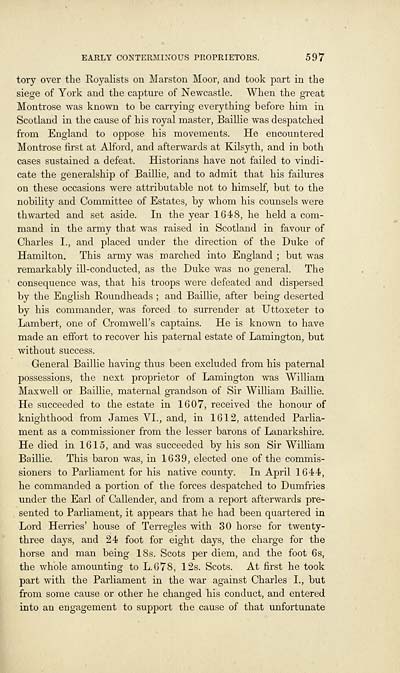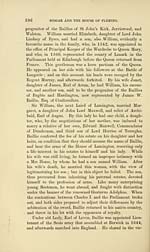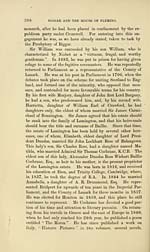Biggar and the House of Fleming
(629) Page 611
Download files
Complete book:
Individual page:
Thumbnail gallery: Grid view | List view

EARLY CONTERMINOUS PROPRIETORS. 597
tory over the Royalists on Marston Moor, and took part in the
siege of York and the capture of Newcastle. When the great
Montrose was known to be carrying everything before him in
Scotland in the cause of his royal master, Baillie was despatched
from England to oppose his movements. He encountered
Montrose first at Alford, and afterwards at Kilsyth, and in both
cases sustained a defeat. Historians have not failed to vindi-
cate the generalship of Baillie, and to admit that his failures
on these occasions were attributable not to himself, but to the
nobility and Committee of Estates, by whom his counsels were
thwarted and set aside. In the year 1648, he held a com-
mand in the army that was raised in Scotland in favour of
Charles I., and placed under the direction of the Duke of
Hamilton. This army was marched into England ; but was
remarkably ill-conducted, as the Duke was no general. The
consequence was, that his troops were defeated and dispersed
by the English Roundheads ; and Baillie, after being deserted
by his commander, was forced to surrender at Uttoxeter to
Lambert, one of Cromwell's captains. He is known to have
made an effort to recover his paternal estate of Lamington, but
without success.
General Baillie having thus been excluded from his paternal
possessions, the next proprietor of Lamington was William
Maxwell or Baillie, maternal grandson of Sir William Baillie.
He succeeded to the estate in 1607, received the honour of
knighthood from James VI., and, in 1612, attended Parlia-
ment as a commissioner from the lesser barons of Lanarkshire.
He died in 1615, and was succeeded by his son Sir William
Baillie. This baron was, in 1639, elected one of the commis-
sioners to Parliament for his native county. In April 1644,
he commanded a portion of the forces despatched to Dumfries
under the Earl of Callender, and from a report afterwards pre-
sented to Parliament, it appears that he had been quartered in
Lord Hemes' house of Terregles with 30 horse for twenty-
three days, and 24 foot for eight days, the charge for the
horse and man being 18s. Scots per diem, and the foot 6s,
the whole amounting to L.678, 12s. Scots. At first he took
part with the Parliament in the war against Charles I., but
from some cause or other he changed his conduct, and entered
into an engagement to support the cause of that unfortunate
tory over the Royalists on Marston Moor, and took part in the
siege of York and the capture of Newcastle. When the great
Montrose was known to be carrying everything before him in
Scotland in the cause of his royal master, Baillie was despatched
from England to oppose his movements. He encountered
Montrose first at Alford, and afterwards at Kilsyth, and in both
cases sustained a defeat. Historians have not failed to vindi-
cate the generalship of Baillie, and to admit that his failures
on these occasions were attributable not to himself, but to the
nobility and Committee of Estates, by whom his counsels were
thwarted and set aside. In the year 1648, he held a com-
mand in the army that was raised in Scotland in favour of
Charles I., and placed under the direction of the Duke of
Hamilton. This army was marched into England ; but was
remarkably ill-conducted, as the Duke was no general. The
consequence was, that his troops were defeated and dispersed
by the English Roundheads ; and Baillie, after being deserted
by his commander, was forced to surrender at Uttoxeter to
Lambert, one of Cromwell's captains. He is known to have
made an effort to recover his paternal estate of Lamington, but
without success.
General Baillie having thus been excluded from his paternal
possessions, the next proprietor of Lamington was William
Maxwell or Baillie, maternal grandson of Sir William Baillie.
He succeeded to the estate in 1607, received the honour of
knighthood from James VI., and, in 1612, attended Parlia-
ment as a commissioner from the lesser barons of Lanarkshire.
He died in 1615, and was succeeded by his son Sir William
Baillie. This baron was, in 1639, elected one of the commis-
sioners to Parliament for his native county. In April 1644,
he commanded a portion of the forces despatched to Dumfries
under the Earl of Callender, and from a report afterwards pre-
sented to Parliament, it appears that he had been quartered in
Lord Hemes' house of Terregles with 30 horse for twenty-
three days, and 24 foot for eight days, the charge for the
horse and man being 18s. Scots per diem, and the foot 6s,
the whole amounting to L.678, 12s. Scots. At first he took
part with the Parliament in the war against Charles I., but
from some cause or other he changed his conduct, and entered
into an engagement to support the cause of that unfortunate
Set display mode to:
![]() Universal Viewer |
Universal Viewer | ![]() Mirador |
Large image | Transcription
Mirador |
Large image | Transcription
Images and transcriptions on this page, including medium image downloads, may be used under the Creative Commons Attribution 4.0 International Licence unless otherwise stated. ![]()
| Histories of Scottish families > Biggar and the House of Fleming > (629) Page 611 |
|---|
| Permanent URL | https://digital.nls.uk/94846830 |
|---|
| Description | A selection of almost 400 printed items relating to the history of Scottish families, mostly dating from the 19th and early 20th centuries. Includes memoirs, genealogies and clan histories, with a few produced by emigrant families. The earliest family history goes back to AD 916. |
|---|

